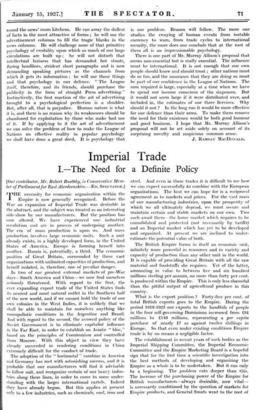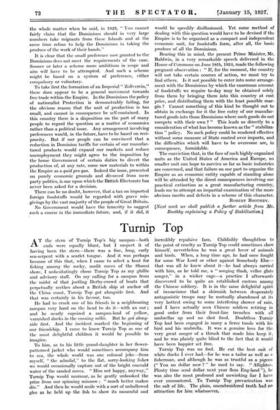Imperial Trade
I.—The Need for a Definite Policy [Our contributor, Mr. Robert Boothby, is Conservative Mem- ber of Parliament for East Aberdeenshire.—En. SPECTATOR.] THE necessity for economic organization within the Empire is now generally recognized. Before the War an expansion .of .Imperial Trade was desirable. in the abstract, and the subject was treated as an interesting side-show by our manufacturers. But the position has now altered. We have experienced one industrial revolution and are in process of undergoing another. The era of mass production is upon us. And . mass production involves large economic units. Such a unit already., exists, in a 'highly developed form, in the United States of America. Europe is forming herself into another. Russia is, potentially, a third. The economic position of Great Britain, surrounded by these vast organizations with unlimited capacities of production, and herself isolated, is, therefore, one of peculiar danger.
In two of our greatest external markets of pre-War days—South America and China—we now find ourselves seriously threatened. With regard to the first, the ever expanding export trade of the United States finds its nearest and most natural outlet in the Southern half of the new world, and if we cannot hold the trade of our own colonies in the West Indies, it is unlikely that we shall be able to maintain for ourselves anything like monopolistic conditions in the Argentine and Brazil. And with regard to the second, the avowed policy of the Soviet Government is to eliminate capitalist influence in the Far East, in order to establish an Asiatic " bloc," based On- the principles of Communism and controlled from Moscow. With this object in view they have already succeeded in rendering conditions in China extremely difficult for the conduct of trade.
The adoption of the " horizontal "combine in America and Germany has met, with astonishing success, and it is probable that our manufacturers will find it advisable to follow suit, and reorganize certain of our heavy indus- tries along these lines, in order to come to some under- standing with the larger international cartels. Indeed they have already begun. But this applies at present only to a few industries, such as chemicals, coal, iron and steel. And even in these trades it is difficult to see how we can expect successfully to combine with the European organizations. The best we can hope for is a reciprocal agreement as to markets and prices. For the vast mass of our manufacturing industries, upon the prosperity of which we all ultimately' depend, we must secure and maintain certain and stable markets on our own. Two such await them—the home market which requires to be consolidated and protected (not necessarily by tariffs) and an Imperial market which has yet to be developed and organiied. At present we are inclined to under- estimate the potential value of both.
The British Empire forms in itself an economic unit, infinitely more powerful in resources and in variety and capacity of production than any other unit in the world. It is capable of providing Great Britain with all the raw material and foodstuffs she requires. Yet of the latter, amounting in value to between five and six hundred millions sterling per annum, no more than forty per cent. is produced within the Empire. This is only less shameful than the pitiful output of agricultural produce in this country.
What is the export position ? Forty-five per cent. of total British exports goes to the Empire. During the period 1918-1925 our exports to the handfuls of people in the four self-governing Dominions increased from 291 millions to £143 millions, representing a per capita purchase of nearly £7 as against twelve shillings in Europe. So that even under existing conditions Empire trade is by no means a negligible factor.
The establishment in recent years of such bodies as the Imperial Shipping Committee, the Imperial Economic Committee and the Empire Marketing Board is a hopeful sign that for the first time a scientific investigation into the best methods of developing and organizing the Empire as a whole is to be undertaken. But it can only be a beginning. The problem cuts deeper than this. The increase of the purchasing power of the Empire for British manufacturers—always desirable, now vital— is necessarily conditioned by the question of markets for Empire products, and General Smuts went to the root of the whole matter when he said, in 1923, " You cannot fairly claim that the Dominions should in very large numbers take migrants from these Islands and at the same time refuse to help the Dominions in taking the produce of the work of their hands."
It is clear that the small preference now granted to the Dominions does not meet the requirements of the case. Sooner or later a scheme more ambitious in scope and aim will have to be attempted. And such a scheme might be based on a system of preference, either compulsory or voluntary.
To take first the formation of an Imperial " Zollverein," there does appear to be a general movement towards free trade within the Empire. In the Dominions the policy of nationalist Protection is demonstrably failing, for the obvious reason that the unit of production is too small, and cannot in consequence be self-contained. In this country there is a disposition on the part of many people to regard the question as a matter of economics rather than a political issue. Any arrangement involving preferences would, in the future, have to be based on reci- procity. But if our people can be convinced that a reduction in Dominion tariffs for certain of our manufac- tured products would expand our markets and reduce unemployment they might agree to the imposition by the home Government of certain duties to divert the production of, at any rate, some raw materials to within the Empire as a quid pro quo. Indeed the issue, presented on purely economic grounds and divorced from mere party politics, is one upon which the British Electorate has never been asked for a decision.
There can be no doubt, however, that a tax on imported foreign foodstuffs would be regarded with grave mis- givings by the vast majority of the people of Great Britain.
No Government would have the temerity to suggest such a course in the immediate future, and, if it did, it would be speedily disillusioned. Yet some method of dealing with this question would have to be devised if the Empire is to be organized as a compact and independent economic unit, for foodstuffs form, after all, the basic produce of all the Dominions.
Bearing this in mind, the present Prime Minister, Mr. Baldwin, in a very remarkable speech delivered in the House of Commons on June 18th, 1924, made the following pregnant observation : " If, for the moment, the country will not take certain courses of action, we must try to find others. Is it not possible to enter into some arrange- ment with the Dominions by which the enormous amount of foodstuffs we require to-day may be obtained solely from them by bringing them into this country at cost price, and distributing them with the least possible mar- gin ? Cannot something of this kind be thought out to obtain in exchange for it the free entry of our manufac- tured goods into those Dominions where such goods do not compete with their own ? " This leads us directly to a consideration of what has become known as the" stabiliza- tion " policy. No such policy could be rendered effective without some measure of State control over imports, and the difficulties which will have to be overcome are, in consequence, formidable.
The conviction that, in the face of such highly-organized units as the United States of America and Europe, no smaller unit can hope to survive so far as basic industries are concerned, and that failure on our part to organize the Empire as an economic entity capable of standing alone will be attended by the direst consequences involving our practical extinction as a great manufacturing country, leads me to attempt an impartial examination of the more obvious merits and defects in a scheme of this character.
ROBERT BOOTHBY.
[Next week we shall publish a further article from Mr. Boothby explaining a Policy of Stabilization.1



































 Previous page
Previous page